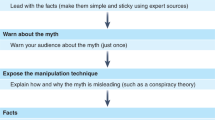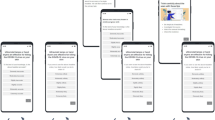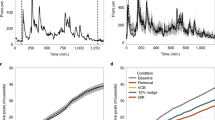Abstract
The spread of misinformation through media and social networks threatens many aspects of society, including public health and the state of democracies. One approach to mitigating the effect of misinformation focuses on individual-level interventions, equipping policymakers and the public with essential tools to curb the spread and influence of falsehoods. Here we introduce a toolbox of individual-level interventions for reducing harm from online misinformation. Comprising an up-to-date account of interventions featured in 81 scientific papers from across the globe, the toolbox provides both a conceptual overview of nine main types of interventions, including their target, scope and examples, and a summary of the empirical evidence supporting the interventions, including the methods and experimental paradigms used to test them. The nine types of interventions covered are accuracy prompts, debunking and rebuttals, friction, inoculation, lateral reading and verification strategies, media-literacy tips, social norms, source-credibility labels, and warning and fact-checking labels.
This is a preview of subscription content, access via your institution
Access options
Access Nature and 54 other Nature Portfolio journals
Get Nature+, our best-value online-access subscription
$29.99 / 30 days
cancel any time
Subscribe to this journal
Receive 12 digital issues and online access to articles
$119.00 per year
only $9.92 per issue
Buy this article
- Purchase on Springer Link
- Instant access to full article PDF
Prices may be subject to local taxes which are calculated during checkout

Similar content being viewed by others
Data availability
All data are available at OSF (https://osf.io/ejyh6) and in the online supplement (https://interventionstoolbox.mpib-berlin.mpg.de).
Code availability
All code is available at OSF (https://osf.io/ejyh6).
References
Lazer, D. M. J. et al. The science of fake news. Science 359, 1094–1096 (2018).
Lewandowsky, S. et al. Technology and Democracy: Understanding the Influence of Online Technologies on Political Behaviour and Decision Making JRC Science for Policy Report (Publications Office of the European Union, 2020).
Proposal for a Regulation of the European Parliament and of the Council on a Single Market for Digital Services (Digital Services Act) and Amending Directive 2000/31/EC (COM/2020/825 Final), https://www.europarl.europa.eu/doceo/document/TA-9-2022-0269_EN.html#title2 (European Parliament, 2020).
Lorenz-Spreen, P., Oswald, L., Lewandowsky, S. & Hertwig, R. A systematic review of worldwide causal and correlational evidence on digital media and democracy. Nat. Hum. Behav. https://doi.org/10.1038/s41562-022-01460-1 (2022).
Kozyreva, A., Smillie, L. & Lewandowsky, S. Incorporating psychological science into policy making. Eur. Psychol. 28, 206–224 (2023).
Lewandowsky, S. et al. Misinformation and the epistemic integrity of democracy. Curr. Opin. Psychol. 54, 101711 (2023).
Rosen, G. Remove, Reduce, Inform: New Steps to Manage Problematic Content, https://about.fb.com/news/2019/04/remove-reduce-inform-new-steps (Meta, 2019).
Douek, E. Governing online speech: from ‘posts-as-trumps’ to proportionality and probability. Columbia Law Rev. 121, 759–834 (2021).
Kozyreva, A. et al. Resolving content moderation dilemmas between free speech and harmful misinformation. Proc. Natl Acad. Sci. USA 120, 2210666120 (2023).
Lewandowsky, S. et al. The Debunking Handbook 2020. Databrary https://doi.org/10.17910/b7.1182 (2020).
Guess, A. M. et al. A digital media literacy intervention increases discernment between mainstream and false news in the United States and India. Proc. Natl Acad. Sci. USA 117, 15536–15545 (2020).
Basol, M., Roozenbeek, J. & Linden, S. Good news about bad news: gamified inoculation boosts confidence and cognitive immunity against fake news. J. Cogn. https://doi.org/10.5334/joc.91 (2020).
Roozenbeek, J., Linden, S., Goldberg, B., Rathje, S. & Lewandowsky, S. Psychological inoculation improves resilience against misinformation on social media. Sci. Adv. 8, 6254 (2022).
Fazio, L. Pausing to consider why a headline is true or false can help reduce the sharing of false news. Harv. Kennedy Sch. Misinformation Rev. https://doi.org/10.37016/mr-2020-009 (2020).
Pennycook, G. et al. Shifting attention to accuracy can reduce misinformation online. Nature 592, 590–595 (2021).
Clayton, K. et al. Real solutions for fake news? Measuring the effectiveness of general warnings and fact-check tags in reducing belief in false stories on social media. Polit. Behav. 42, 1073–1095 (2020).
Pennycook, G. & Rand, D. G. The psychology of fake news. Trends Cogn. Sci. 25, 388–402 (2021).
Brady, W. J., Wills, J. A., Jost, J. T., Tucker, J. A. & Van Bavel, J. J. Emotion shapes the diffusion of moralized content in social networks. Proc. Natl Acad. Sci. USA 114, 7313–7318 (2017).
Van Bavel, J. J. et al. Political psychology in the digital (mis)information age: a model of news belief and sharing. Soc. Issues Policy Rev. 15, 84–113 (2021).
Wineburg, S., Breakstone, J., McGrew, S., Smith, M. D. & Ortega, T. Lateral reading on the open internet: a district-wide field study in high school government classes. J. Educ. Psychol. 114, 893–909 (2022).
Osborne, J. et al. Science Education in an Age of Misinformation (Stanford Univ., 2022).
Lorenz-Spreen, P., Lewandowsky, S., Sunstein, C. R. & Hertwig, R. How behavioural sciences can promote truth, autonomy and democratic discourse online. Nat. Hum. Behav. 4, 1102–1109 (2020).
Kozyreva, A., Lewandowsky, S. & Hertwig, R. Citizens versus the internet: confronting digital challenges with cognitive tools. Psychol. Sci. Public Interest 21, 103–156 (2020).
Ecker, U. K. H. et al. The psychological drivers of misinformation belief and its resistance to correction. Nat. Rev. Psychol. 1, 13–29 (2022).
Roozenbeek, J., Culloty, E. & Suiter, J. Countering misinformation: evidence, knowledge gaps, and implications of current interventions. Eur. Psychol. 28, 189–205 (2023).
Pennycook, G., Binnendyk, J., Newton, C. & Rand, D. G. A practical guide to doing behavioural research on fake news and misinformation. Collabra Psychol. 7, 25293 (2020).
Wright, C. et al. Effects of brief exposure to misinformation about e-cigarette harms on Twitter: a randomised controlled experiment. BMJ Open 11, 045445 (2021).
Badrinathan, S. Educative interventions to combat misinformation: evidence from a field experiment in India. Am. Polit. Sci. Rev. 115, 1325–1341 (2021).
Ziemer, C.-T. & Rothmund, T. Psychological underpinnings of misinformation countermeasures. J. Media Psychol. https://doi.org/10.1027/1864-1105/a000407 (2024).
Geers, M. et al. The online misinformation engagement framework. Curr. Opin. Psychol. 55, 101739 (2023).
Hornsey, M. J. & Lewandowsky, S. A toolkit for understanding and addressing climate scepticism. Nat. Hum. Behav. 6, 1454–1464 (2022).
Fasce, A. et al. A taxonomy of anti-vaccination arguments from a systematic literature review and text modelling. Nat. Hum. Behav. 7, 1462–1480 (2023).
Blair, R. A. et al. Interventions to counter misinformation: lessons from the Global North and applications to the Global South. Curr. Opin. Psychol. 55, 101732 (2024).
IJzerman, H. et al. Use caution when applying behavioural science to policy. Nat. Hum. Behav. 4, 1092–1094 (2020).
Twitter Comms. More reading—people open articles 40% more often after seeing the prompt. X, https://web.archive.org/web/20220804154748/; https://twitter.com/twittercomms/status/1309178716988354561 (2020).
About Community Notes on X, https://help.twitter.com/en/using-x/community-notes (accessed 16 February 2024).
Thaler, R. H. & Sunstein, C. R. Nudge: Improving Decisions about Health, Wealth, and Happiness (Yale Univ. Press, 2008).
Thaler, R. H. & Sunstein, C. R. Nudge: The Final Edition (Yale Univ. Press, 2021).
Pennycook, G. & Rand, D. G. Accuracy prompts are a replicable and generalizable approach for reducing the spread of misinformation. Nat. Commun. 13, 2333 (2022).
X Support. Sharing an article can spark conversation, so you may want to read it before you Tweet it. X, https://twitter.com/twittersupport/status/1270783537667551233 (2020).
Andı, S. & Akesson, J. Nudging away false news: evidence from a social norms experiment. Digit. J. 9, 106–125 (2020).
Hertwig, R. & Grüne-Yanoff, T. Nudging and boosting: steering or empowering good decisions. Perspect. Psychol. Sci. 12, 973–986 (2017).
Brodsky, J. E. et al. Improving college students’ fact-checking strategies through lateral reading instruction in a general education civics course. Cogn. Res. Princ. Implic. 6, 23 (2021).
Panizza, F. et al. Lateral reading and monetary incentives to spot disinformation about science. Sci. Rep. 12, 5678 (2022).
Barzilai, S. et al. Misinformation is contagious: middle school students learn how to evaluate and share information responsibly through a digital game. Comput. Educ. 202, 104832 (2023).
Tay, L. Q., Hurlstone, M. J., Kurz, T. & Ecker, U. K. H. A comparison of prebunking and debunking interventions for implied versus explicit misinformation. Br. J. Psychol. 113, 591–607 (2022).
Lewandowsky, S. & Linden, S. Countering misinformation and fake news through inoculation and prebunking. Eur. Rev. Soc. Psychol. 32, 348–384 (2021).
Gottfried, J. A., Hardy, B. W., Winneg, K. M. & Jamieson, K. H. Did fact checking matter in the 2012 presidential campaign? Am. Behav. Sci. 57, 1558–1567 (2013).
Huang, H. A war of (mis)information: the political effects of rumors and rumor rebuttals in an authoritarian country. Br. J. Polit. Sci. 47, 283–311 (2017).
Porter, E. & Wood, T. J. The global effectiveness of fact-checking: evidence from simultaneous experiments in Argentina, Nigeria, South Africa, and the United Kingdom. Proc. Natl Acad. Sci. USA 118, 2104235118 (2021).
Porter, E., Velez, Y. & Wood, T. J. Correcting COVID-19 vaccine misinformation in 10 countries. R. Soc. Open Sci. 10, 221097 (2023).
Badrinathan, S. & Chauchard, S. ‘I don’t think that’s true, bro!’ Social corrections of misinformation in India. Int. J. Press Polit. https://doi.org/10.1177/19401612231158770 (2023).
Arechar, A. A. et al. Understanding and combatting misinformation across 16 countries on six continents. Nat. Hum. Behav. 7, 1502–1513 (2023).
Offer-Westort, M., Rosenzweig, L. R. & Athey, S. Battling the coronavirus 'infodemic' among social media users in Kenya and Nigeria. Nat. Hum. Behav., https://doi.org/10.1038/s41562-023-01810-7 (2024).
Ali, A. & Qazi, I. A. Countering misinformation on social media through educational interventions: evidence from a randomized experiment in Pakistan. J. Dev. Econ. 163, 103108 (2023).
Maertens, R., Roozenbeek, J., Basol, M. & Linden, S. Long-term effectiveness of inoculation against misinformation: three longitudinal experiments. J. Exp. Psychol. Appl. 27, 1–16 (2021).
Grady, R. H., Ditto, P. H. & Loftus, E. F. Nevertheless, partisanship persisted: fake news warnings help briefly, but bias returns with time. Cogn. Res. Princ. Implic. 6, 52 (2021).
Paynter, J. et al. Evaluation of a template for countering misinformation—real-world autism treatment myth debunking. PLoS ONE 14, 0210746 (2019).
Ecker, U. K. H., Butler, L. H. & Hamby, A. You don’t have to tell a story! A registered report testing the effectiveness of narrative versus non-narrative misinformation corrections. Cogn. Res. Princ. Implic. 5, 64 (2020).
Schmid, P. & Betsch, C. Effective strategies for rebutting science denialism in public discussions. Nat. Hum. Behav. 3, 931–939 (2019).
Johnson, H. M. & Seifert, C. M. Sources of the continued influence effect: when misinformation in memory affects later inferences. J. Exp. Psychol. Learn. Mem. Cogn. 20, 1420–1436 (1994).
Lewandowsky, S., Stritzke, W. G. K., Oberauer, K. & Morales, M. Memory for fact, fiction, and misinformation: the Iraq War 2003. Psychol. Sci. 16, 190–195 (2005).
Guay, B., Berinsky, A. J., Pennycook, G. & Rand, D. How to think about whether misinformation interventions work. Nat. Hum. Behav. 7, 1231–1233 (2023).
Mosleh, M., Pennycook, G. & Rand, D. G. Field experiments on social media. Curr. Dir. Psychol. Sci. 31, 69–75 (2021).
Aslett, K., Guess, A. M., Bonneau, R., Nagler, J. & Tucker, J. A. News credibility labels have limited average effects on news diet quality and fail to reduce misperceptions. Sci. Adv. 8, eabl3844 (2022).
Carleton Athey, S., Cersosimo, M., Koutout, K. & Li, Z. Emotion- versus Reasoning-Based Drivers of Misinformation Sharing: A Field Experiment Using Text Message Courses in Kenya Stanford University Graduate School of Business Research Paper No. 4489759 (SSRN, 2023).
Almaatouq, A. et al. Beyond playing 20 questions with nature: integrative experiment design in the social and behavioral sciences. Behav. Brain Sci. https://doi.org/10.1017/S0140525X22002874 (2022).
Cooper, H., Hedges, L. V. & Valentine, J. C. (eds) The Handbook of Research Synthesis and Meta-analysis (Russell Sage Foundation, 2019).
Lakens, D. Calculating and reporting effect sizes to facilitate cumulative science: a practical primer for t-tests and ANOVAs. Front. Psychol. 4, 62627 (2013).
Pek, J. & Flora, D. B. Reporting effect sizes in original psychological research: a discussion and tutorial. Psychol. Methods 23, 208–225 (2018).
Sharp, C., Kaplan, R. M. & Strauman, T. J. The use of ontologies to accelerate the behavioral sciences: promises and challenges. Curr. Dir. Psychol. Sci. 32, 418–426 (2023).
Spadaro, G. et al. The Cooperation Databank: machine-readable science accelerates research synthesis. Perspect. Psychol. Sci. 17, 1472–1489 (2022).
Cooper, H. & Patall, E. A. The relative benefits of meta-analysis conducted with individual participant data versus aggregated data. Psychol. Methods 14, 165–176 (2009).
Forscher, P. S. et al. The benefits, barriers, and risks of big-team science. Perspect. Psychol. Sci. 18, 607–623 (2022).
Duckworth, A. L. & Milkman, K. L. A guide to megastudies. PNAS Nexus 5, pgac214 (2022).
Hameiri, B. & Moore-Berg, S. L. Intervention tournaments: an overview of concept, design, and implementation. Perspect. Psychol. Sci. 17, 1525–1540 (2022).
Susmann, M., Fazio, L., Rand, D. G. & Lewandowsky, S. Mercury Project Misinformation Intervention Comparison Study. OSF https://doi.org/10.17605/OSF.IO/FE8C4 (2023).
Roozenbeek, J. et al. Susceptibility to misinformation is consistent across question framings and response modes and better explained by myside bias and partisanship than analytical thinking. Judgm. Decis. Mak. 17, 547–573 (2022).
Reijula, S. & Hertwig, R. Self-nudging and the citizen choice architect. Behav. Public Policy 6, 119–149 (2022).
Bak-Coleman, J. B. et al. Combining interventions to reduce the spread of viral misinformation. Nat. Hum. Behav. 6, 1372–1380 (2022).
Bode, L. & Vraga, E. The Swiss cheese model for mitigating online misinformation. Bull. At. Sci. 77, 129–133 (2021).
Milli, S., Carroll, M., Wang, Y., Pandey, S., Zhao, S. & Dragan, A. Engagement, user satisfaction, and the amplification of divisive content on social media. Knight First Amend. Inst. https://perma.cc/YUB7-4HMY (2024).
Willaert, T. A computational analysis of Telegram’s narrative affordances. PLoS ONE 18, e0293508 (2023).
Pasquetto, I. V. et al. Tackling misinformation: what researchers could do with social media data. Harv. Kennedy Sch. Misinformation Rev. https://doi.org/10.37016/mr-2020-49 (2020).
Guess, A. M. et al. How do social media feed algorithms affect attitudes and behavior in an election campaign? Science 381, 398–404 (2023).
Acknowledgements
We thank S. Vrtovec, F. Stock and A. Horsley for research assistance and D. Ain for editing the manuscript and the online appendix. We also thank J. van Bavel, W. Brady, Z. Epstein, M. Leiser, L. Oswald, J. Rozenbeek and A. Simchon for their contributions during the workshop ‘Behavioral interventions for promoting truth and democratic discourse in online environments’. The study was funded by a grant from the Volkswagen Foundation to R.H., S.L. and S.M.H. (project ‘Reclaiming individual autonomy and democratic discourse online: how to rebalance human and algorithmic decision making’). A.K., P.L.-S., R.H., S.L. and S.M.H. also acknowledge funding from the EU Horizon project no. 101094752 ‘Social media for democracy (SoMe4Dem)’. S.L. was supported by a Research Award from the Humboldt Foundation in Germany and by an ERC Advanced Grant (no. 101020961 PRODEMINFO) while this research was conducted. U.K.H.E. was supported by an Australian Research Council Future Fellowship (no. FT190100708). H.L. acknowledges funding from the French Agence Nationale de la Recherche under the Investissement d'Avenir program ANR-17-EURE-0010.
Author information
Authors and Affiliations
Contributions
Conceptualization: A.K., P.L.-S., S.M.H., S.L., U.K.H.E. and R.H. Visualization: A.K. and S.M.H. Supervision: P.L.-S., S.M.H., S.L., U.K.H.E. and R.H. Writing—original draft: A.K., P.L.-S., U.K.H.E., M.G. and J.B.-C. Writing—review and editing: A.K., P.L.-S., S.M.H., S.L., U.K.H.E. and R.H. Coordinating authors: A.K., P.L.-S., S.M.H., S.L., U.K.H.E. and R.H. Contributing authors: A.A., J.B.-C., S.B., M.B., A.J.B., C.B., J.C., L.K.F., M.G., A.M.G., H.H., H.L., R.M., F.P., G.P., D.G.R., S.R., J.R., P. Schmid, M.S., B.S.-T., P. Szewach, S.v.d.L. and S.W.
Corresponding author
Ethics declarations
Competing interests
For studies included in the evidence overview, G.P., D.G.R. and A.J.B. received research funding and research support through gifts from Google and Meta. A.M.G. and A.A. received an unrestricted research grant from Meta. L.K.F. received research funding from Meta. S.v.d.L., S.R. and S.L. received research funding from Google Jigsaw. S.W. and M.S. received research funding from Google.org. All other authors declare no competing interests.
Peer review
Peer review information
Nature Human Behaviour thanks Madalina Vlasceanu and Kevin Aslett for their contribution to the peer review of this work.
Additional information
Publisher’s note Springer Nature remains neutral with regard to jurisdictional claims in published maps and institutional affiliations.
Supplementary information
Supplementary Information
The supplement includes additional information about co-authors and a note on interventions selection process.
Rights and permissions
Springer Nature or its licensor (e.g. a society or other partner) holds exclusive rights to this article under a publishing agreement with the author(s) or other rightsholder(s); author self-archiving of the accepted manuscript version of this article is solely governed by the terms of such publishing agreement and applicable law.
About this article
Cite this article
Kozyreva, A., Lorenz-Spreen, P., Herzog, S.M. et al. Toolbox of individual-level interventions against online misinformation. Nat Hum Behav (2024). https://doi.org/10.1038/s41562-024-01881-0
Received:
Accepted:
Published:
DOI: https://doi.org/10.1038/s41562-024-01881-0



